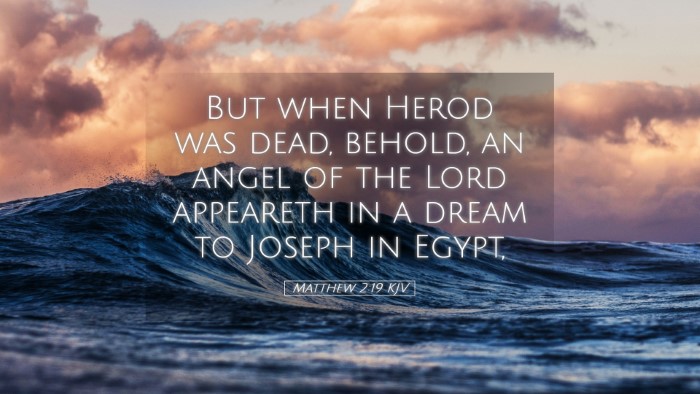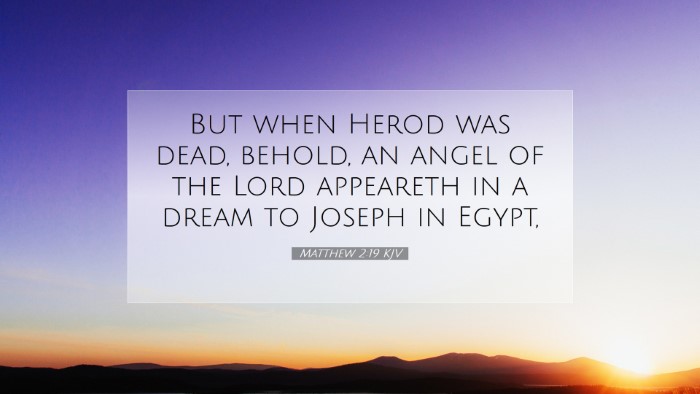Commentary on Matthew 2:19
Verse Text: "But when Herod was dead, behold, an angel of the Lord appeareth in a dream to Joseph in Egypt."
Introduction
This verse marks a significant turning point in the early life of Jesus and in the narrative of Matthew's Gospel. Here, we witness divine intervention guiding Joseph, the earthly father of Jesus, as he navigates the perilous political landscape of Judea under Herod's tyrannical reign.
Contextual Analysis
The events preceding this verse (Matthew 2:13-18) describe the flight of Joseph, Mary, and Jesus into Egypt to escape King Herod's decree to kill all male infants in Bethlehem. Herod's death signifies the end of a chapter marked by fear and the shadow of death that loomed over the holy family. This commentary will explore insights from various public domain sources.
Divine Guidance After Herod's Death
Matthew Henry's Commentary: Henry emphasizes the providence of God in this passage, illustrating how divine guidance is often provided in times of peril. After Herod’s death, an angel appears to Joseph in a dream to instruct him to return to Israel. This reflects God's timing and sovereignty; just as He protected Jesus from Herod's wrath, He also orchestrates circumstances for the family's safe return.
Albert Barnes' Notes: Barnes elaborates on the angelic visitation, noting that angels serve as God's messengers. The timing of the message is crucial—confirming that the threat was over and providing Joseph with the necessary assurance to proceed. The phrase "behold" indicates a moment of divine revelation and highlights the importance of paying attention to God’s guidance.
Theological Implications
Adam Clarke's Commentary: Clarke points out the theological significance of this return to Israel. It serves as a reflection of the Old Testament pattern where God frequently intervened in the lives of His chosen people. Joseph’s dream illustrates God’s method of communication, reinforcing that God often speaks in quiet moments and through ordinary means to direct and protect His people.
Echoes of the Exodus
This return from Egypt can also draw parallels to the Exodus narrative, where God led His people out of bondage. Clarke notes that this recalls the redemption theme prevalent throughout Scripture, suggesting that Jesus is the ultimate fulfillment of Israel’s hope and deliverance from oppression.
Moral Application for Believers
- Trust in Divine Guidance: As we reflect on the obedience of Joseph, believers are reminded of the importance of discerning God's voice amid confusion and fear. Joseph’s sensitive responsiveness to the angel's commands serves as an example of faith for us today.
- God's Sovereignty in Adversity: This verse connects believers with the assurance that God is sovereign and works through adversity. Herod’s death allows for the fulfillment of God's plan, confirming that His purposes will prevail despite human opposition.
- Patience in God's Timing: Joseph's waiting on God's directive encourages patience in our own lives. The believer’s life is often marked by periods of waiting and trusting in God’s perfect timing for breakthrough and direction.
Conclusion
Matthew 2:19 encapsulates a moment of hope amidst darkness, showcasing the interplay between divine intervention and human obedience. The angel's message to Joseph not only signifies the death of a tyrant but also heralds the safe passage of the Messiah back to His homeland. Pastors and theologians can draw from this passage to illustrate God’s unyielding faithfulness and the importance of listening for His voice in our lives.
A deeper examination of this text can inspire believers to trust in God’s plans, realizing that even in moments of uncertainty, His guidance can bring clarity and direction. This passage ultimately reminds us that Jesus, born to be King, is sovereign over all authorities and circumstances.


